
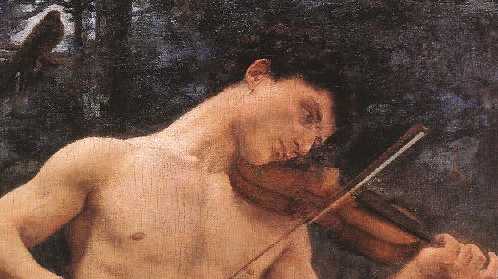
While Roberto Alagna has portrayed some of the noblest characters in the tenor repertoire with great success, his brother David’s production brings anything but simplicity to the table. Yet there is a saving grace out there, and her name is Pina Bausch.
So bad news first: the team of Alagna & Alagna comes up short. A single DVD [Bel Air Classiques BAC 052] presents a version of Orphée et Eurydice that few would recognize. In fact, it isn’t even close. While revision of this opera is nothing terribly new, usually to accommodate changing preferences in voice types, this version David Alagna created flies so viciously in the face of what Gluck intended that it doesn’t deserve the honor of retaining the name.
The incidental music originally interspersed throughout the opera has all been moved to the beginning to create an entirely unnecessary Prologue. We are shown the joyful wedding of Orpheus and Eurydice (chock full of heavy-handed foreshadowing), followed by the car crash that kills Eurydice (chock-full of firemen in red pleather jumpsuits). Once we are brought up to speed on the backstory (just in case in the rest of the show you hadn’t figured out that Orpheus and Eurydice were married), we finally begin the opera.
The sets throughout are visually beautiful; design is certainly a talent that David Alagna has in spades. The underworld as conceived by David Alagna is frightening and yet calm, with a glassy sheen over suspended bodies. The light design of Aldo Solbiati brings mystery, beauty, and at times fright to your heart. So, visually this production has much to offer.
Musically it’s pretty good too. The very “period” sounding Orchestra of the Teatro Comunale di Bologna responds beautifully to the conducting of Giampaolo Bisanti. It has been a long while since I’ve heard such strains of anguish, happiness, peace, and tumult all come from one orchestra.
Roberto Alagna creates isolated moments of beauty throughout the opera, especially in the first scene of Act I where his only sound is the eruption of the name of his recently deceased beloved. Alagna puts the full force of his rather substantial tenor behind a sound so full of anger, so pained, and yet so beautiful that you instantly feel for him. But in general he sounds noticeably uncomfortable as Orphée, with strain in the upper register and overly forceful treatment of much of the music. “J’ai perdu mon Eurydice” evokes beautiful tone yet little emotion as his leonine figure stares down into the depths of the stage with no clear feeling.
Another “improvement” by David Alagna was the replacement of Amore with a character he names “Le Guide.” In the program notes David Alagna says he tried to evoke the idea of Virgil as a guide through the underworld as seen in Dante’s Inferno. In this production Le Guide seems like more of a demonic figure, confusing the audience into questioning the motives of this character. Marc Barrard struggles with intonation and lacks much in the way of expression in his singing. His forceful baritone lacks focus and line but does at times seem aggressive and menacing, further creating the image of a villain where there should be none.
As Eurydice, Serena Gamberoni sings with technical prowess, a beautiful tone and big, emotive eyes that are unfortunately under used. She clearly has chemistry with Alagna — the two would be a convincing Nedda and Canio if given the opportunity — but as Orpheus and Eurydice you glean no passion from the pair. Unfortunately she is thrown around stage acting like a child as she pouts about her husband’s avoidance of her eyes, and then like a whore as she makes love to Le Guide on the hood of a Packard station wagon in an attempt to gain Orpheus’ attention.
It is this type of inopportune decision that typifies the David Alagna experience. In his attempt to create a work in the vein of Gluck’s original, that “noble simplicity”, he drags this production down from what it could have been to what it is: unfortunate insignificance.
Now that the gloom and doom is out of the way, I have some good news. A new DVD of this wonderful opera [Bel Air Classiques BAC444] is worth not only purchase but worship. The recently late and long-time great Pina Bausch set about the daunting task or re-imagining the Gluck’s Orpheus tale for a “tanzoper” to be put on in the great ballet city of Paris. Her minimal aesthetic, intricate choreography and brilliant directorial decisions make for a video so touching that you question why this hadn’t been done 100 years before. The effect is truly noble and beautifully simple.
This production casts the singers mostly as onlookers in the drama. The chorus is placed offstage, and the women singing the principal roles all are confined mainly to the outskirts of the stage. Maria Riccarda Wesseling sings Orpheus with an earthy and warm mezzo, but is challenged by the choice in key for the role. The low tessitura is clearly an issue and is better suited to a true contralto or countertenor, but she does not force her sound and maintains beauty at the expense of volume.
Soprano Julia Kleiter sings Eurydike fully and lustily; the full range of emotion and depth of her humanity are clearly evident in her performance. Clean legato and appropriate phrasing add even more to her wonderful sound. As Amor, Sunhae Im offers a youthful agility and brightness that livens up her character wonderfully. The humor and playfulness in her aria is wonderfully supported by the Balthasar-Neumann Ensemble led by Thomas Hengelbrock. The period orchestra is best when summoning the fires of their sound, but is still touching in the heartbreaking finale; the completion of the dramatic circle.
But the greatest accomplishment here is the vision of Pina Bausch. This “tanzoper” speaks to me as something more genuine and original than many productions I’ve seen in the past. While my ideal for a performance is not the most accurate historical re-creation of a piece, for some reason I believe that dance was at one time or another the focal point of this opera given the dance heavy French opera influence in the piece. Nonetheless, this is a work of incredible beauty and emotion.
The simple setting, mostly in grayscale with a brief excursion to flowing rose colored gowns, draw the eye toward contrast and heighten the movements of the chorus. The wonderful dancing of Yann Bridard brings a youthful love bordering on obsession that is keenly crafted. His Eurydike is Marie-Agnés Gillot, whose strong and anguished movements make you believe that Eurydice is not an attention starved child but is actually hurt by Orpheus’ avoidance of her eyes. Her pain is real and her decision is justified. The brief dance by Miteki Kudo as Amor is equally youthful and quirky as her soprano counterpart, but with a touch more sensuality.
I won’t ruin some of the coup de theâtre of the production, but what Bausch achieves is human and emotive in its purest form. Gluck would surely be proud to have his music be part of such a work of art.














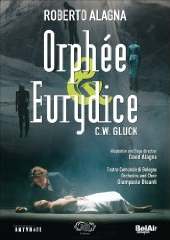
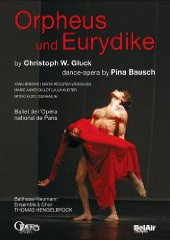

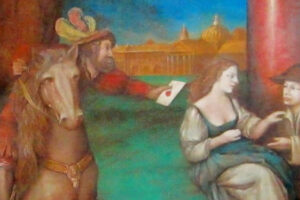
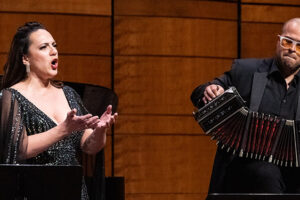






Comments